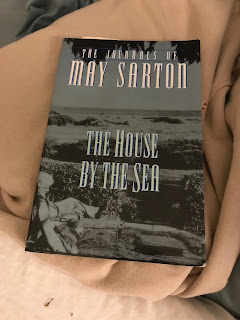Photo by Anna Reavis
I've been stressing myself out for a month about writing a post on my beach reading of Tess of the D'Urbervilles by Thomas Hardy. I know it's one of the backbones of British Literature, and I know I'm supposed to love it, but honestly, Tess gets on my nerves.
When I read the novel in high school, I wrote a paper on "Fatalism in Hardy's Tess of the D'Urbervilles." And when I was in high school, I probably saw the entire plot as fatalistic. As an adult, however, I am more able to recognize how much a part we play in our own happiness. Tess says early on in the novel that we live on a blighted star, but in truth, is it not more correct to believe along the lines of this Tess quote: "A strong woman who recklessly throws away her strength, she is worse than a weak woman who has never had any strength to throw away." (Gender doesn't matter here; this quote just happens to refer to a woman.)
We bear responsibility for our own choices, regardless of the curves life throws at us. Hardy never seems to decide which matters more: our fate or our choices. I think our choices are what matter more. A person always contributes to his (or in this case, her) own downfall. The more you expect of yourself, the more you can expect to be hurt because you will always assume others see things as you do, which is not true at all. Tess acts out of her sense of personal responsibility and concern for the people she loves, and her over-developed sense of duty costs her dearly. She expects better of Alec, of her parents, and of Angel, because she would have behaved better toward them. What destroys her in the end is her naive expectation of love, coupled with her sense of moral duty. The lesson here is not an uplifting one.




4 comments:
I need to re-read this novel, it's been a while. I do remember being very unsympathetic towards Angel when I read it, but I was much younger then, my sympathies may have changed!
I still felt sympathetic toward Tess, just less so than on my first read as a teenager. Interestingly, my teen daughter read Tess with me, and she had even less sympathy for Tess. I think it's very hard for teens now to understand being trapped by societal rules.
I have no sympathy for Angel. I like him less even than Alec, who, for the most part, is at least honest about what an ass he is.
I love Tess, both the novel and... Tess herself. But admittedly, the book can be frustrating, I mean what Tess suffers is so unjust, in my opinion. I've written a couple of things along these lines in the past:
http://bookpuddle.blogspot.ca/2005/06/double-standards.html
http://bookpuddle.blogspot.ca/2005/10/thomas-hardys-tess.html
I completely agree with your take on hypocrisy, and I agree that Tess, for the most part, is a victim of her surroundings. She does choose, however, to stay with Alec for several months after the first seduction. I think that's a point a lot of people miss in the novel. I guess I just kept wishing she would stand up for herself and tell her family to eff off. I know, I know, modern women have choices she didn't. I have read all of Hardy's novels and enjoyed them all.
Post a Comment